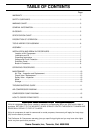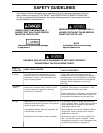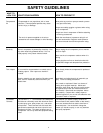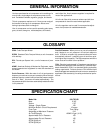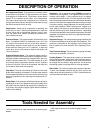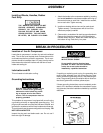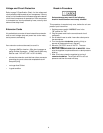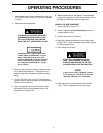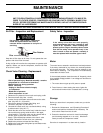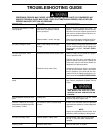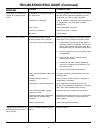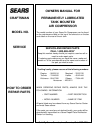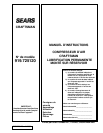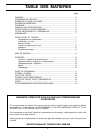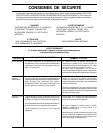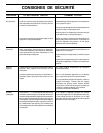
10
MAINTENANCE
ALL MAINTENANCE AND REPAIR OPERATIONS NOT LISTED MUST BE DONE BY A QUALIFIED SERVICE TECHNICIAN.
Air Filter - Inspection and Replacement
Hot surfaces. Risk of burn. Compressor
heads are exposed when filter cover is
removed. Allow compressor to cool prior to
servicing.
Filter
Filter Retainer
Keep the air filter clean at all times. Do not operate the com-
pressor with the air filter removed.
A dirty air filter will not allow the compressor to operate at full
capacity. Before you use the compressor, check the air filter
to be sure it is clean.
Check Valve Cleaning - Replacement
1. Release all air pressure from air tank and unplug outfit.
2. Remove shroud. (Key Nos. 1 and 2)
3. Loosen the top and bottom nuts and remove the outlet
tube. (Key Nos. 31, 33, and 34)
4. Remove the pressure release tube, fitting, and
connector. (Key Nos. 25, 26 and 27)
5. Unscrew the check valve (turn counterclockwise) using
a socket wrench. (Key No. 17)
6. Check that the valve disc moves freely inside the check
valve and that the spring holds the disc in the upper,
closed position. The check valve may be cleaned with a
solvent, such as paint and varnish remover.
7. Apply a Teflon based pipe sealant to the check valve
threads. Reinstall the check valve (turn clockwise).
8. Replace the pressure release tube and fitting.
9. Replace the outlet tube and tighten top and bottom nuts.
10.Replace the shroud.
If the safety valve does not work properly,
over-pressurization may occur, causing air tank
rupture or an explosion. Before starting com-
pressor, pull the ring on the safety valve to make
sure that the safety valve operates freely. If the
valve is stuck or does not operate smoothly, it
must be replaced with the same type of valve.
Risk of personal injury. Manifold assembly contains
compressed air which can be hazardous.
Manifold gets hot during operation.
Before servicing:
•Unplug or disconnect electrical supply
to compressor.
•Bleed tank of pressure.
•Allow compressor to cool.
Safety Valve - Inspection
Motor
The motor has an automatic reset thermal overload protector.
If the motor overheats for any reason, the overload protector
will shut off the motor. The motor must be allowed to cool
down before restarting. The compressor will automatically
restart after the motor cools.
If the overload protector shuts the motor off frequently, check
for a possible voltage problem. Low voltage can also be sus-
pected when:
1. The motor does not get up to full power or speed.
2. Fuses blow out when starting the motor; lights dim
and remain dim when motor is started and is running.
Storage
Before you store the air compressor, make sure you do the
following:
1. Review the Maintenance and “Operating Procedures”
sections and perform maintenance as necessary. Be
sure to drain water from the air tank.
2. Protect the electrical cord and air hose from damage
(such as being stepped on or run over). Wind them
loosely around the compressor handle.
Store the air compressor in a clean and dry location.
UNIT CYCLES AUTOMATICALLY WHEN POWER IS ON. WHEN DOING MAINTENANCE, YOU MAY BE EX-
POSED TO VOLTAGE SOURCES, COMPRESSED AIR OR MOVING PARTS. PERSONAL INJURIES CAN
OCCUR. BEFORE PERFORMING ANY MAINTENANCE OR REPAIR, UNPLUG THE COMPRESSOR AND
BLEED OFF ALL AIR PRESSURE.



